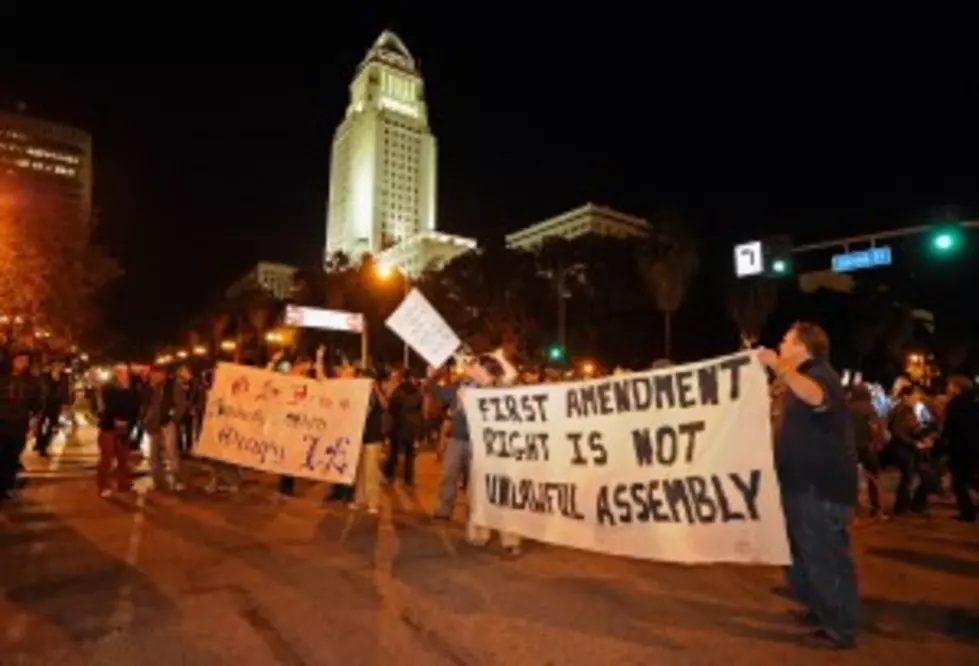
Calm Prevails As Occupy Deadlines Pass In 2 Cities
LOS ANGELES (AP) — Deadlines for Wall Street protesters to leave their encampments came and went in two cities with no arrests in Philadelphia and a festive, party-like atmosphere as protesters in Los Angeles defied the order clear out early Monday.
Protesters defied the mayor's deadline to vacate their encampment near City Hall in Los Angeles, with about 1,000 flooding into the area as hundreds of tents remained standing as they have for nearly two months.
A celebratory atmosphere filled the night with protesters milling about the park and streets by City Hall in seeming good spirits. A group on bicycles circled the block, one of them in a cow suit. Organizers led chants with a bull horn.
"The best way to keep a non-violent movement non-violent is to throw a party, and keep it festive and atmospheric," said Brian Masterson.
Police presence was slight right after the 12:01 a.m. PST Monday deadline, but it began increasing as the morning wore on. At the same time, the number of protesters dwindled.
"People have been pretty cooperative tonight. We want to keep it peaceful," police Cmdr. Andrew Smith told The Associated Press.
He refused to discuss how or when police will move to clear the park, but he said: "We're going to do this as gently as we possibly can. Our goal is not to have anybody arrested. Our goal is not to have to use force."
A deadline set by the city for Occupy Philadelphia to leave the site where it has camped for nearly two months passed Sunday without any arrests.
The reactions to the expired deadlines in Los Angeles and Philadelphia were far different from those in other cities in recent weeks, where pepper spray, tear gas and police action have been used in the removal of long-situated demonstrators since the movement against economic disparity and perceived corporate greed began with Occupy Wall Street in Manhattan two months ago.
Dozens of tents remained at the encampment outside Philadelphia's City Hall Monday morning, twelve hours after a city-imposed deadline passed for the protesters to move to make way for a construction project.
No arrests were immediately reported Monday. The camp appeared mostly quiet amid a heavy police presence, but around 5 a.m. EST a handful of people were marching one of the city's main business corridors banging drums.
The scene outside City Hall was quiet most of the day Sunday. But the sound of protesters' drumming did bring complaints from several people living in nearby high-rise apartment buildings.
In Los Angeles, by 2:30 a.m., most protesters had moved from the camp site in the park to the streets. That put them technically in compliance with the mayor's eviction order, but could lead to confrontation with police if they try to clear the streets.
There have so far been no arrests or reports of violence.
"We're still here, it's after 12, ain't nobody throwing anything at the cops, they haven't come in and broken anyone's noses yet, so it's a beautiful thing," said Adam Rice, a protester standing across the street from police in riot gear.
In Philadelphia, along the steps leading into a plaza, about 50 people sat in lines Sunday with the promise that they would not leave unless they were carried out by authorities. For a time, they linked arms. But as it seemed that a forceful ouster was not imminent, they relaxed a bit. A police presence was heavier than usual but no orders to leave had been issued.
A few dozen tents remained scattered on the plaza, along with trash, piles of dirty blankets and numerous signs reading, "You can't evict an idea."
Several hundred supporters surrounded those who were prepared to face arrest for one of the Occupy movement meetings known as a general assembly.
The meeting started out with logistics — making sure those sitting in had quarters to make calls from jail and that someone was gathering important medical information — but it soon turned to big ideas.
The protesters described their many hopes for a better world. Among them: reparations for slavery and Native American lands, better and more inspiring schools, recognizing gay marriage, and end to homelessness, fewer TVs and better pay for artists. Some of those who spoke with hope and joined in rendition of "Lean on Me," had goggles with them, just in case pepper spray is used.
There was a sense that the occupation in front of Philadelphia's Gothic-style City Hall would soon be over, but hope that the movement would last.
"This is just baby steps," said R.W. Dennen, who said he felt a bit guilty that he wasn't preparing to be arrested.
Elsewhere on the East Coast, eight people were arrested in Maine after protesters in the Occupy Augusta encampment in Capitol Park took down their tents and packed their camping gear after being told to get a permit or move their shelters.
Protesters pitched tents Oct. 15 as part of the national movement but said Sunday they shouldn't have to get a permit to exercise their right to assemble. Occupy leaders said a large teepee loaned by the Penobscot Indians and a big all-weather tent would stay up.
In Philadelphia, Steve Venus was fortifying the area around his tent with abandoned wood pallets left over from those who had already packed up. He said the $50 million construction project, including a planned ice skating rink, was not a good enough reason for Occupy Philadelphia to leave the plaza.
Venus, 22, said that by enforcing the deadline, the city was essentially telling Occupy supporters "your issues are not important. The only issue that's important is the ice skating rink."
On Friday, Mayor Michael Nutter expressed support for the movement's ideals but said protesters must make room for the long-planned project, which they were told of when they set up camp Oct. 6.
Nutter was out of town Sunday, but his spokesman reiterated that "people are under orders to move."
The mayor himself had an exchange on Twitter with hip-hop impresario Russell Simmons, who asked Nutter "to remember this is a non-violent movement — please show restraint tonight."
Nutter's response: "I agree."
Graffiti, lack of sanitation and fire hazards, including smoking in tents, were among the city's chief concerns at Dilworth, which had about 350 tents at the height of the movement.
More From K2 Radio









